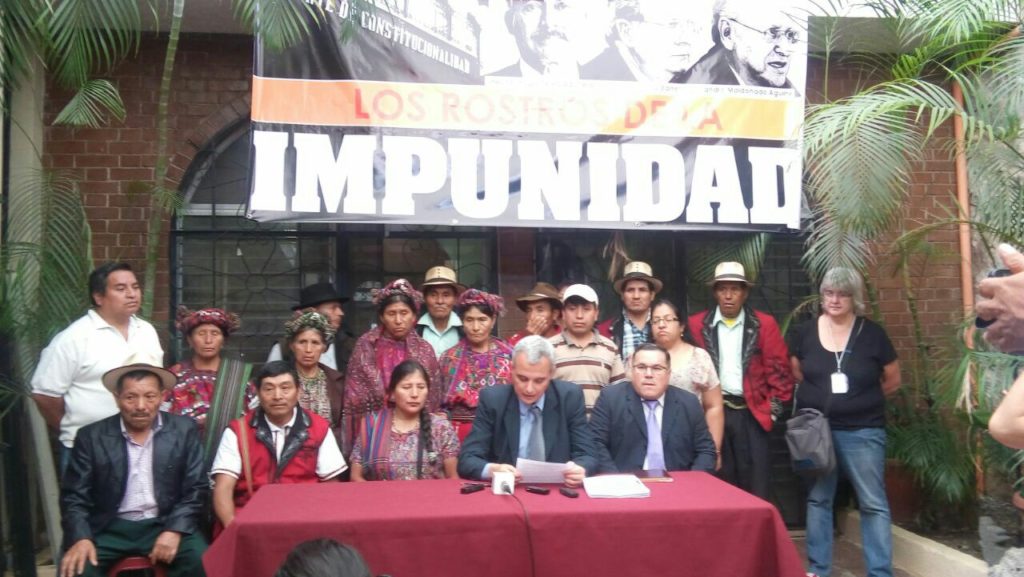On Wednesday, the Center for Human Rights Legal Action (CALDH), one of the civil parties to the genocide case against former dictator José Efraín Ríos Montt, announced that it is filing legal motions against three former judges of the Constitutional Court.
The motion alleges that the judges committed legal prevarication, or breach of duty, when they ruled on May 20, 2013 to partially suspend the genocide proceedings and thereby vacated the guilty verdict rendered against Ríos Montt by High Risk Tribunal “A” on May 10, 2103.
The announcement by CALDH coincided with the fourth anniversary of the Rios Montt conviction.
CALDH is calling upon the Attorney General’s Office to name a special prosecutor to investigate the charges against the three former judges, Alejandro Maldonado Aguirre, Héctor Hugo Pérez Aguilera, and Roberto Molina Barreto, who overturned the conviction. Two other judges, Gloria Porras and Mario Chacón, signed separate dissenting opinions.
According to CALDH, in Guatemalan law, a judge commits the crime of legal prevarication when his or her resolutions are contrary to the law or are based on false information or events. Those found guilty of the crime can face two to six years in prison. When it involves a conviction, as it would be in this case, it is punishable from three to six years.
The charges presented by CALDH address three elements they deem illegal and constitute the crime of legal prevarication. First, CALDH affirms that the May 20 resolution filed by the three judges presents false information about legal motions filed by the defense. In their ruling, the judges affirm that Francisco García Gudiel, Ríos Montt’s defense attorney, filed a motion for reinstatement in relation to the recusal motion he filed against the trial judges. CALDH affirms that this is false; Gudiel filed a motion for reinstatement in relation to his expulsion from the proceedings by the presiding judge of High Risk Court “A,” Judge Yassmin Barrios, on March 19, the first day of the proceedings, after she refused to accept his recusal motion.
The second piece of false information relied on by the judges also has to do with Gudiel’s recusal motion. The judges affirm that Judge Barrios failed to review Gudiel’s recusal motion. However, CALDH notes that the audio and videos of the proceedings, as well as press reports, clearly demonstrate that this is untrue and that Judge Barrios gave the defense lawyer an opportunity to present his motion on three separate occasions.
Thirdly, CALDH asserts that Guatemalan law establishes that the trial court is charged with resolving all aspects of the proceedings, except a reinstatement motion, which may then lead to a subsequent appeal. However, such an appeal would have to follow its course through ordinary legal channels. CALDH affirms that the Constitutional Court is not empowered to suspend ongoing proceedings, making the May 20 ruling illegal and in contravention of the principles of a criminal legal proceeding.
Since the Constitutional Court’s decision, several attempts to restart the genocide case against Ríos Montt have failed, and the case remains in legal limbo. The High Risk Tribunal “B,” which is currently in charge of the case, has determined that Ríos Montt suffers from dementia. Therefore, he will be prosecuted in a closed-door proceeding and will not be required to be present. If Ríos Montt is found guilty, he will not be required to fulfill the terms of his sentence.
According Juan Francisco Soto, Executive Director of CALDH, the genocide case reveals how the legal system permits malicious litigation by the defense lawyers. “Their objective was to delay the proceedings and perpetuate impunity,” he told IJ Monitor, and are the reason for the legal action announced on Wednesday. “The two judges who signed dissenting opinions expressed their disagreement with the majority ruling and warned about the grave consequences this illegal decision would have for the justice system.”
“Our goal is to reclaim the victims’ truth, continue the demand for justice in the genocide case, and strengthen the rule of law in Guatemala,” Soto stated.
Jo-Marie Burt is an Associate Professor of Political Science and Latin American Studies at George Mason University. She is also a Senior Fellow at the Washington Office on Latin America (WOLA). Paulo Estrada is a human rights activist, archaeology student at San Carlos University, and civil party in the Military Diary case.

